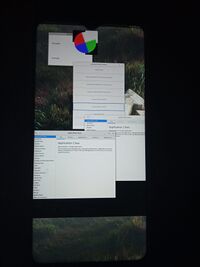Xiaomi Redmi Note 8 Pro (xiaomi-begonia): Difference between revisions
m adjust to new chipset naming rules (https://gitlab.com/postmarketOS/wiki/-/issues/69) |
m Seperate software from version |
||
| Line 6: | Line 6: | ||
| imagecaption = Redmi Note 8 Pro running Weston | | imagecaption = Redmi Note 8 Pro running Weston | ||
| releaseyear = 2019 | | releaseyear = 2019 | ||
| originalsoftware = Android 9.0 | | originalsoftware = Android | ||
| originalversion = 9.0 (MIUI 11) | |||
| chipset = MediaTek Helio G90T (MT6785) | | chipset = MediaTek Helio G90T (MT6785) | ||
| cpu = Octa-core (2x2.05 GHz Cortex-A76 & 6x2.0 GHz Cortex-A55) | | cpu = Octa-core (2x2.05 GHz Cortex-A76 & 6x2.0 GHz Cortex-A55) | ||
Revision as of 05:50, 27 December 2022
 Redmi Note 8 Pro running Weston | |
| Manufacturer | Xiaomi |
|---|---|
| Name | Redmi Note 8 Pro |
| Codename | xiaomi-begonia |
| Released | 2019 |
| Hardware | |
| Chipset | MediaTek Helio G90T (MT6785) |
| CPU | Octa-core (2x2.05 GHz Cortex-A76 & 6x2.0 GHz Cortex-A55) |
| GPU | Mali-G76 MC4 |
| Display | 1080 x 2340 |
| Storage | 64/128/256 GB |
| Memory | 6/8 GB |
| Architecture | aarch64 |
| Software | |
| Original software | Android |
| Original version | 9.0 (MIUI 11) |
| postmarketOS | |
| Category | testing |
| Pre-built images | no |
| Mainline | no |
| postmarketOS kernel | 4.14.218 |
| Unixbench Whet/Dhry score | 5577.1 |
| Flashing |
Works |
|---|---|
| USB Networking |
Works |
| Internal storage |
No data |
| SD card |
No data |
| Battery |
Broken |
| Screen |
Works |
| Touchscreen |
Works |
| Multimedia | |
| 3D Acceleration |
Broken |
| Audio |
Broken |
| Camera |
Broken |
| Camera Flash |
No data |
| Connectivity | |
| WiFi |
Broken |
| Bluetooth |
Broken |
| GPS |
Broken |
| NFC |
No data |
| Modem | |
| Calls |
Broken |
| SMS |
Broken |
| Mobile data |
Broken |
| Miscellaneous | |
| FDE |
Broken |
| USB OTG |
Works |
| HDMI/DP |
No data |
| Sensors | |
| Accelerometer |
Broken |
| Magnetometer |
No data |
| Ambient Light |
No data |
| Proximity |
No data |
| Hall Effect |
No data |
| Haptics |
No data |
| Barometer |
No data |
Contributors
Maintainer(s)
Users owning this device
- Cxt
- KittyLe (Notes: running pmOS)
- Michaelskyf (Notes: Daily driver - LineageOS 19.0)
- Operachi (Notes: Droidian Phosh)
- PiotrZPL (Notes: Sold after the Mediatek CPU ruined my mental health.)
- Prowindows62 (Notes: cannot be used for testing)
- Sohrabbehdani (Notes: running CrDroid)
How to enter flash mode
Unlocking the bootloader
Sign up for a Mi Account, register your device in the settings, and wait for a week. More info
Before you go any further
Please read Redmi Note 8 Pro XDA Megathread
Entering recovery
+
Entering fastboot
+
Installation
!!! Install CFW 2.0
Redmi Note 8 Pro doesn't quite like custom ROMs normally, so you have to flash a few blank files to get different custom ROMs to work.
- Download CFW2.0 and unzip it.
- Go to a folder with your device's codename in it.
- Run
!_FLASH_IT_L.shon Linux/macOS or!_FLASH_IT_W.baton Windows. - After this, follow the next steps.
Via fastboot
pmbootstrap initpmbootstrap installpmbootstrap flasher flash_rootfspmbootstrap flasher flash_kernelfastboot reboot
Via zip
pmbootstrap initpmbootstrap install --android-recovery-zippmbootstrap export- Transfer the zip to the device
adb push /tmp/postmarketOS-export/pmos-xiaomi-begonia.zip /sdcard
- Flash the zip
- Reboot
Unbricking
If something went terribly wrong (eg. boot.img doesn't contain valid DTB) your device will hard-brick. Fortunately these days it's pretty easy to unbrick the device.
Requirements (GNU/Linux):
- Kernel patched with this patch
- Python3:
pyusb pyserial json5 - SP Flash Tool (tested with version 5.2208)
- Mediatek Bypass utility
- Known working partitions (from backup or Android ROM)
- MT6785 scatter file
Steps:
- Run the exploit
- Connect the device via USB and hold Volume Up (+)
- When "Protection disabled" message appears, open SP Flash Tool
- Select partition images that you want to write and click Download
- After green checkmark image appears, restart your phone
Mainline kernel
To boot mainline kernel you need:
- Non-CFW based Android boot.img
- Non-CFW firmware
- osm0sis/mkbootimg
- Android kernel (For dtb)
- This simple script (Remember to modify it)
Remember to enable pstore console
If you don't get current logs in /proc/last_kmsg, try building the output.img without ramdisk (that will force kernel panic)
You also need to patch drivers/watchdog/mtk_wdt.c to support "mediatek,mt6785-toprgu", otherwise the phone will reboot after a while
The goal is to enable framebuffer or usb, so we can progress with mainlining
Misc
Andoid memory map
$ sudo cat /proc/iomem
Partition table
$ sudo parted
(parted) list
Booting process
1. BROM (Boot ROM)
Boots when power is applied to SoC. Initializes flash storage and starts preloader
2. PL (Preloader)
Initializes basic devices like usb, gpio, timers, etc. If Volume Up (+) is held, PL will hand controll back to BROM wth EDL (Emergency Download Mode).
3. LK (Little Kernel)
Displays logo and verifies some partitions (TODO: which partitions).
If it fails to verify partition, it won't continue.
!IMPORTANT! LK WILL USE DTB (Device Tree Blob) FOUND IN BOOT.IMG which means that if DTB is invalid, the device will be hard-bricked
4. Linux
Additional info
See also
- pmaports!1909 Initial merge request